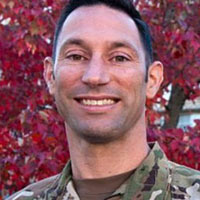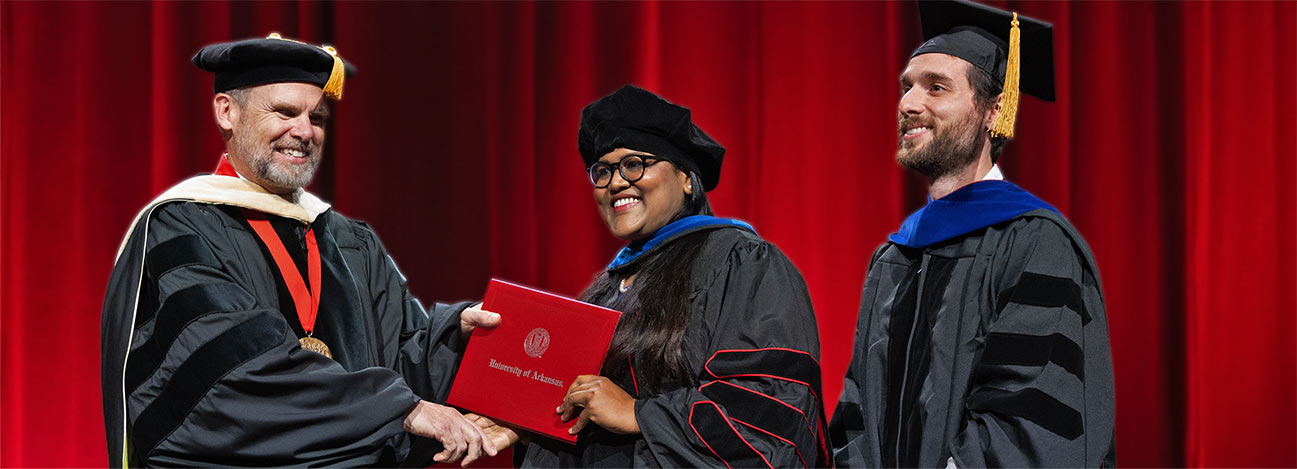
Alicia M. Johnson, Ph.D. 2022
Assistant Professor at the University of Massachusetts Amherst
What were the most valuable skills you gained or experiences you had during your time
in the program?
The most valuable skill I gained was learning how to think like an academic to create
new knowledge. The hands-on opportunities, combined with my coursework and regular
mentorship from my advisors, pushed me to think differently and tackle practitioner
problems in ways I had never considered before. The most valuable experiences I had
were forming lifelong relationships with other doctoral students in the program, many
of whom I maintain close relationships with even now, years after graduating.
What does a typical day in the life of a Walton Ph.D. student look like?
I would often go into the office, attend classes, teach, and/or develop and run studies
to advance my research depending on the stage of the program and the day. I would
also often work for a couple of hours in the evenings as my schedule allowed, and
complete course work some weekend mornings earlier on in the program. Throughout the
week, I would also meet regularly with my advisors and research collaborators, attend
brown bags or research presentations, and connect with community organizations.

Garrett Rybak, Ph.D. 2022
Lt. Col. in the United States Air Force
Why did you choose Walton for a Ph.D. in Marketing, and why should prospective students
do the same?
I chose Walton for my Ph.D. in Marketing because of the research productivity of the
faculty, the abundance of resources and facilities to conduct research, and the alignment
of faculty interests with my own. What I didn’t realize until after I started the
program was the most critical to my development. Yes, the faculty are some of the
most prolific researchers in the discipline, but they also maintain a culture of teamwork
and co-creation with their students. Even though I had limited research experience,
the Marketing faculty treated me as a collaborative member on all projects, and they
spent countless hours helping me transform my research ideas into publications.
What were the most valuable skills you gained or experiences you had during your time
in the program?
The most valuable skills I learned from the program include hands-on experience conducting
research, crafting theoretical developments backed by rigorous statistical analysis,
and navigating the publication and review process. Much like an apprenticeship, the
best way to learn these processes is to do them, and the Walton program offered me
ample opportunities to partner with faculty members on their research or to collaboratively
explore my own. Additionally, the course offerings gave me an in-depth knowledge of
experimental design and statistical analysis with a foundation steeped in the marketing,
consumer behavior, and psychology literatures. The experiences and knowledge from
this program have given me the proficiency necessary to publish in Marketing’s top
journals.
Anything else you would like to share?
There is one thing I would like to emphasize. Prospective Ph.D. students should choose
a program based on the quality of the faculty and alignment with their research interests.
The faculty at Walton were devoted to my success as a researcher and exceeded all
my expectations.

Atmadeep Mukherjee, Ph.D. 2022
Assistant Professor at Weber State University
Why did you choose Walton for a Ph.D. in Marketing, and why should prospective students
do the same?
I chose the Walton Ph.D. for three key reasons: my research interests matched with
the research areas of the faculty, a very collegial and collaborative atmosphere,
and the generous monthly stipend.
What were the most valuable skills you gained or experiences you had during your time
in the program?
I believe the most valuable skills that I gained while in the program to succeed as
an Assistant Professor were effective and efficient time management, the need to develop
a research pipeline along with a research network to contribute to the discipline,
and all the scholarly skills needed to be a prolific researcher and educator.
What does a typical day in the life of a Walton Ph.D. student look like?
My typical day at Walton was divided into three key sections: classes and associated
activities, research activities such as data collection and manuscript preparation,
and a significant portion was devoted to reading.

Sarah Grace, Ph.D. 2021
Teaching Assistant Professor at the University of Arkansas
Why did you choose Walton for a Ph.D. in Marketing, and why should prospective students
do the same?
The kindness I experienced from the faculty at Walton is unmatched. I will never forget
that the Marketing doctoral program chair answered a random call from the graduate
admissions office and was able, willing, and excited to share more about the marketing
doctoral program with me (on a random Tuesday in July!). This strong initial impression
was solidified by every touchpoint with faculty thereafter.
What were the most valuable skills you gained or experiences you had during your time
in the program?
The Ph.D. program teaches you how to think theoretically, which is an opportunity
I’ve never quite encountered in my decade of corporate life, and a skill you don’t
usually learn in an undergraduate or MBA program. That’s what sets the Ph.D. apart:
can you test, expand, or even refute theory? We do this through different research
techniques, and that’s also a lot of what I learned how to do in the Ph.D. program.
What does a typical day in the life of a Walton Ph.D. student look like?
I followed the principles of “deep work” and fought to maintain a solid writing practice
(of 3-4 hour blocks) throughout the entirety of my Ph.D. program, and that’s the best
advice I could give to any doc student. Writing is thinking, and if you’re going to
advance knowledge in any substantial way, you must have dedicated time for thinking.
Of course, you also have to balance this idealism with attending classes your first
two years, teaching a class your second-fourth years, and collaborating with faculty
on research projects.
Anything else you would like to share? The people at Walton make the difference.






 The Walton Marketing Ph.D. provides a collaborative environment to conduct research
with top scholars in areas of research such as relationship marketing, retail/sales/services,
branding, consumer decision-making, and digital marketing.
The Walton Marketing Ph.D. provides a collaborative environment to conduct research
with top scholars in areas of research such as relationship marketing, retail/sales/services,
branding, consumer decision-making, and digital marketing.


